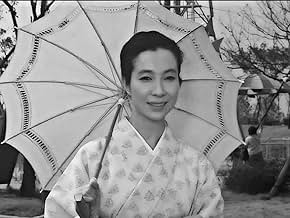Añade un argumento en tu idiomaTwo friends meet in a bar. Later that night, one friend's flirtatious wife is reportedly in an accident. The other friend doesn't feel well. What's come over him?Two friends meet in a bar. Later that night, one friend's flirtatious wife is reportedly in an accident. The other friend doesn't feel well. What's come over him?Two friends meet in a bar. Later that night, one friend's flirtatious wife is reportedly in an accident. The other friend doesn't feel well. What's come over him?
- Dirección
- Guión
- Reparto principal
- Premios
- 1 premio en total
Reseñas destacadas
Mikio Naruse was essentially dramatic-family director often exploiting this thematic genre, in this neo Japanese Noir he keeping dealing with human emotions even in a murdering plot, actually the picture didn't focused in solve the case, it remains at large, eventually the police appears here and there almost bureaucratically, the summarized plot is about an extra-marital affair where the beauty mistress went to die in Tokyo's apartment, the perpetrator is Keijo Kobayashi a kind of family man, turns out that such lover is his best friend's wife played by Tatsuya Mihashi, then eaten up by guilt Kobayashi enters in despair ends up confessing for his faithful wife Michiyo Aratama, however just the marital betrayal.
It seemingly wasn't enough appease his heart, once more falling apart he has to telling to his wife that in fact was the strangler by accident, even baffled Michiyo pleading for secrecy, although it doesn't takes to long, the remorseful Kobayashi has a nerve to tell the awful truth to Mihashi claiming for his contempt, instead an early anger Mihashi seems not care about it, actually he understands that his former wife was a worthless woman, then in a dead end Kobayashi decides to turn himself into the police.
The picture points out utterly in the Japanese background concerning the honor, whereby they used to value it more than western civilizations, for instance committing Harakiri in some specific cases of dishonors, it applies here on deep manner, we can testify his painful life carrying a heavy burden, nonetheless the director settled another outcome as the occidental title suggest.
Thanks for reading.
Resume:
First watch: 2024 / How many: 1 / Source: DVD / Rating: 8.
It seemingly wasn't enough appease his heart, once more falling apart he has to telling to his wife that in fact was the strangler by accident, even baffled Michiyo pleading for secrecy, although it doesn't takes to long, the remorseful Kobayashi has a nerve to tell the awful truth to Mihashi claiming for his contempt, instead an early anger Mihashi seems not care about it, actually he understands that his former wife was a worthless woman, then in a dead end Kobayashi decides to turn himself into the police.
The picture points out utterly in the Japanese background concerning the honor, whereby they used to value it more than western civilizations, for instance committing Harakiri in some specific cases of dishonors, it applies here on deep manner, we can testify his painful life carrying a heavy burden, nonetheless the director settled another outcome as the occidental title suggest.
Thanks for reading.
Resume:
First watch: 2024 / How many: 1 / Source: DVD / Rating: 8.
The early career of Naruse Mikio included several forays to genres other than his usual quiet home dramas, but still, by the 1950's, he had developed a very recognizable style that was reliable and altered from film to film only slightly. But near the end of his career, he did offer a surprise. Both his third-to-last and second-to-last films are crime thrillers! I'll give this to him, neither Ozu nor Mizoguchi could have ever ventured so far from the expected tofu or women's weepies.
I recently watched "Hikinige" (Hit and Run, 1966), which came out after "Onna no naka ni iru tanin" (The Stranger Within a Woman, 1966). Both are highly interesting experiments, that have some merit to them, both also clear failings. Unlike "Hikinige", this film is actually based on a French novel by Edouard Atiyah. However, by far the biggest French flavor of the film comes from the cinematography by Fukuzawa Yasumichi. The stark contrast of the black and white images, the abundant use of shadows and light, and the coldness of the film's visual reality bring to mind French filmmakers from Glouzot and Becker to Melville and Chabrol. In fact, Chabrol adapted the same novel just five years later. His "Juste avant la nuit" (1971) is less ambitious than Naruse's work, but out of the two, easily the more watchable movie.
Tashiro (Kobayashi Keiju) and Sugimoto (Mihashi Tatsuya) are best friends. When Sugimoto's wife (Wakabayashi Akiko) gets murdered by an unknown killer whom the husband suspects to be her lover, Tashiro suddenly starts to feel very guilt-ridden. This leads to depression, that has an immediate effect to his own family life with his wife (Aratama Michiyo).
The film is interesting, but doesn't feel cohesive. It goes from being one film to something else several times over. It starts as this French crime narrative, very modern for Naruse, but after a while, the director finds his usual peaceful tempo, and brings the film closer to a home drama about Tashiro's family. The final act - which I will not spoil - is most uneven, since it tries to piece together influences from both Dostoevsky and Hitchcock. The fact that all these predecessors are visible in the finished film makes Naruse look like a novice, when it comes to crime films.
This is a bleak film, a study of guilt, that also broods about our meaningless existence. There are some plot choices, that are clearly in the film only because the original novel forced Naruse's hand. The sexuality in the flashback sequences is one such example, as well as the ending. My issue with the film is that after a good first act, the narrative stops, which would be fine, since Naruse is clearly going for "Crime and Punishment" here. But the characters aren't interesting enough. The two guys are both portrayed as living corpses. Nobody has much passion. The best performance is the one by Aratama, since she at least reacts to things. Also the grandmother, played by Nagaoka Teruko, was a pleasant addition.
I got the sense that, between the lines, the filmmaker is also issuing a critique of rich, materialist way of life, since the main family lives a luxurious lifestyle. He would return to this theme more clearly in "Hikinige", and both films include interesting details about 60's homes and the artifacts there in.
The best thing about the film is easily the cinematography, but as a narrative, this doesn't match to Chabrol's version, nor to Naruse's "Hikinige" which soon followed.
I recently watched "Hikinige" (Hit and Run, 1966), which came out after "Onna no naka ni iru tanin" (The Stranger Within a Woman, 1966). Both are highly interesting experiments, that have some merit to them, both also clear failings. Unlike "Hikinige", this film is actually based on a French novel by Edouard Atiyah. However, by far the biggest French flavor of the film comes from the cinematography by Fukuzawa Yasumichi. The stark contrast of the black and white images, the abundant use of shadows and light, and the coldness of the film's visual reality bring to mind French filmmakers from Glouzot and Becker to Melville and Chabrol. In fact, Chabrol adapted the same novel just five years later. His "Juste avant la nuit" (1971) is less ambitious than Naruse's work, but out of the two, easily the more watchable movie.
Tashiro (Kobayashi Keiju) and Sugimoto (Mihashi Tatsuya) are best friends. When Sugimoto's wife (Wakabayashi Akiko) gets murdered by an unknown killer whom the husband suspects to be her lover, Tashiro suddenly starts to feel very guilt-ridden. This leads to depression, that has an immediate effect to his own family life with his wife (Aratama Michiyo).
The film is interesting, but doesn't feel cohesive. It goes from being one film to something else several times over. It starts as this French crime narrative, very modern for Naruse, but after a while, the director finds his usual peaceful tempo, and brings the film closer to a home drama about Tashiro's family. The final act - which I will not spoil - is most uneven, since it tries to piece together influences from both Dostoevsky and Hitchcock. The fact that all these predecessors are visible in the finished film makes Naruse look like a novice, when it comes to crime films.
This is a bleak film, a study of guilt, that also broods about our meaningless existence. There are some plot choices, that are clearly in the film only because the original novel forced Naruse's hand. The sexuality in the flashback sequences is one such example, as well as the ending. My issue with the film is that after a good first act, the narrative stops, which would be fine, since Naruse is clearly going for "Crime and Punishment" here. But the characters aren't interesting enough. The two guys are both portrayed as living corpses. Nobody has much passion. The best performance is the one by Aratama, since she at least reacts to things. Also the grandmother, played by Nagaoka Teruko, was a pleasant addition.
I got the sense that, between the lines, the filmmaker is also issuing a critique of rich, materialist way of life, since the main family lives a luxurious lifestyle. He would return to this theme more clearly in "Hikinige", and both films include interesting details about 60's homes and the artifacts there in.
The best thing about the film is easily the cinematography, but as a narrative, this doesn't match to Chabrol's version, nor to Naruse's "Hikinige" which soon followed.
¿Sabías que...?
- ConexionesVersion of Al anochecer (1971)
Selecciones populares
Inicia sesión para calificar y añadir a tu lista para recibir recomendaciones personalizadas
Detalles
- Fecha de lanzamiento
- País de origen
- Idioma
- Títulos en diferentes países
- The Stranger Within a Woman
- Empresa productora
- Ver más compañías en los créditos en IMDbPro
- Duración1 hora 42 minutos
- Color
- Mezcla de sonido
- Relación de aspecto
- 1.37 : 1
Contribuir a esta página
Sugerir un cambio o añadir el contenido que falta

Principal laguna de datos
By what name was Onna no naka ni iru tanin (1966) officially released in Canada in English?
Responde















